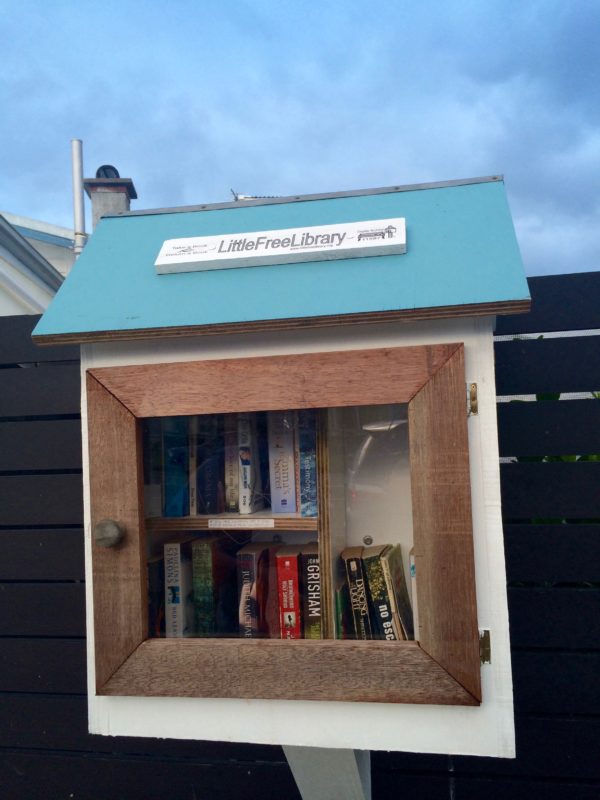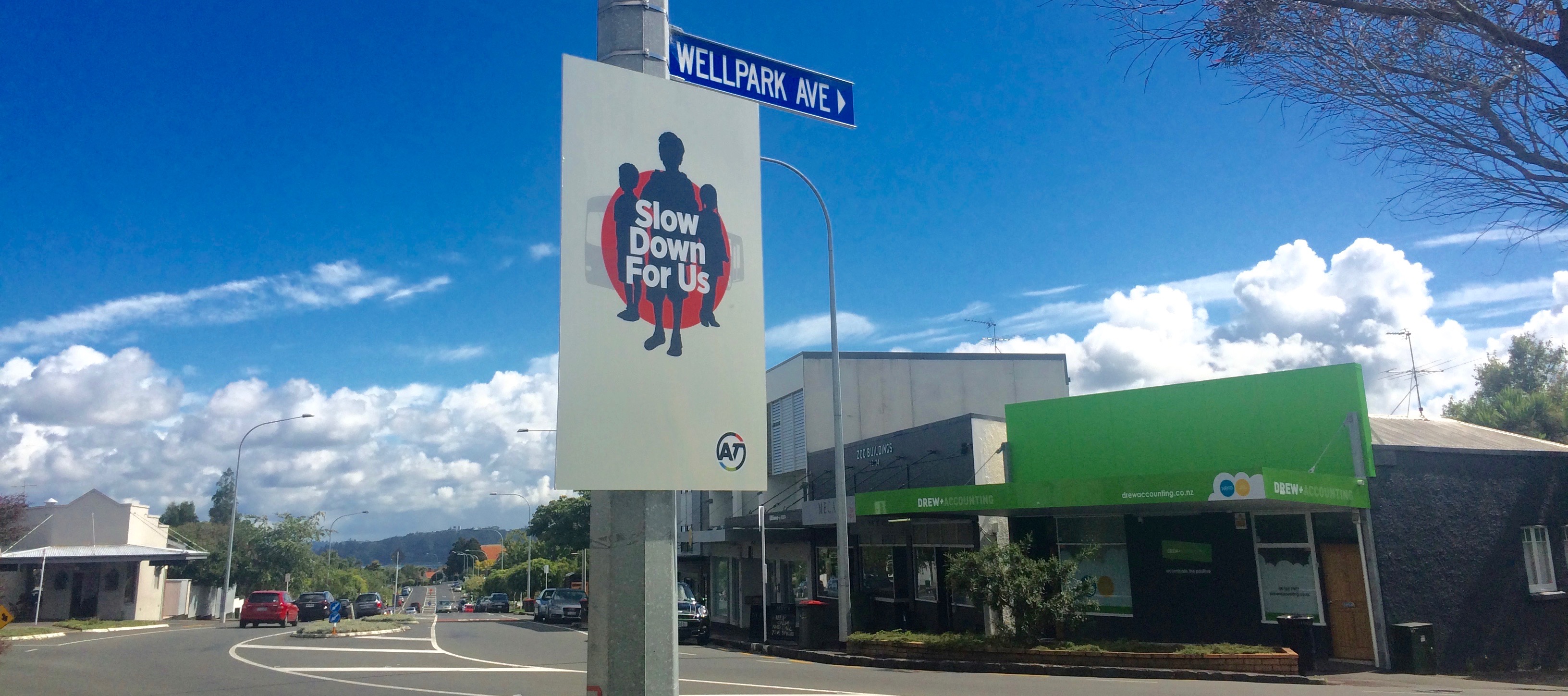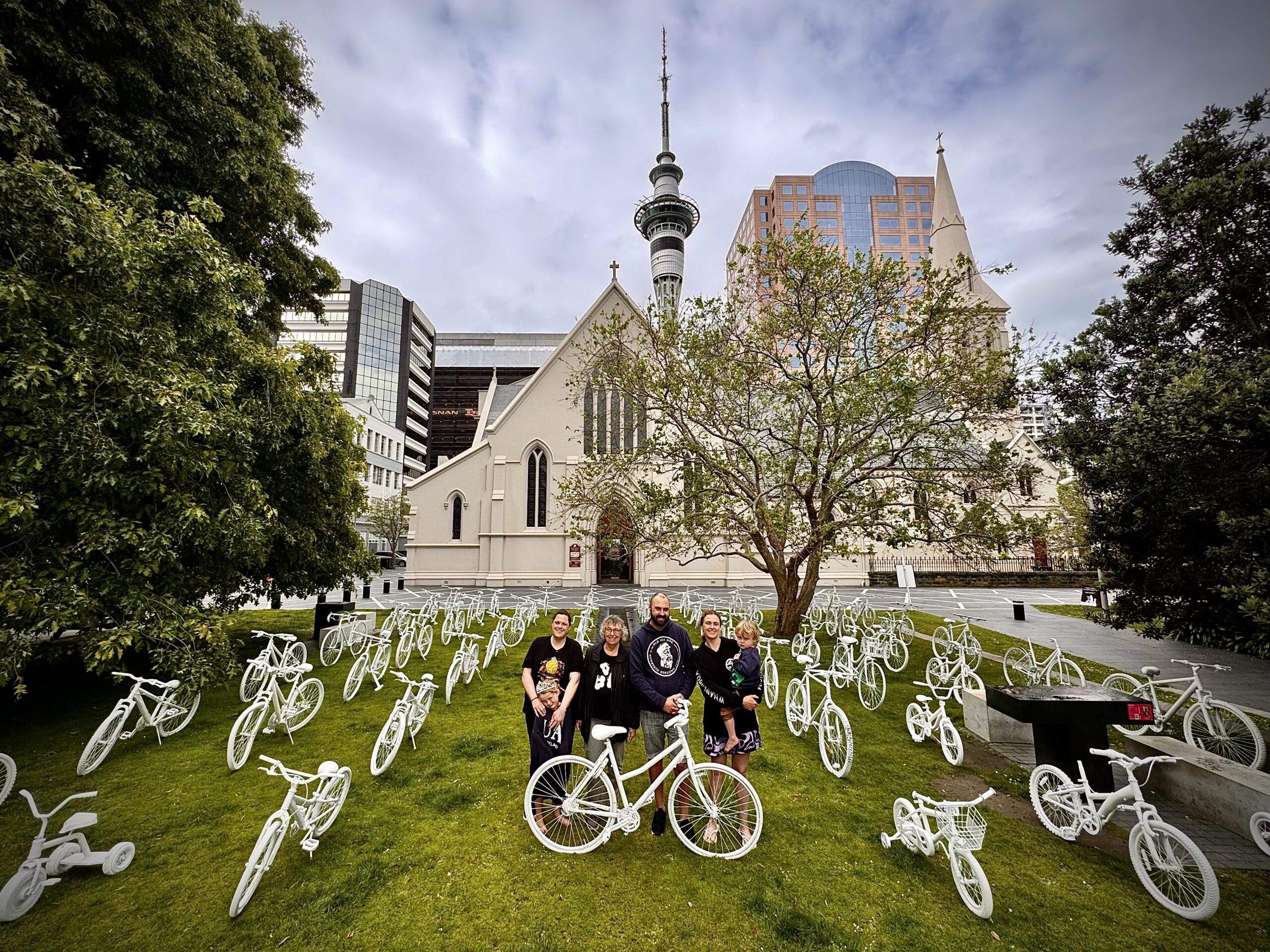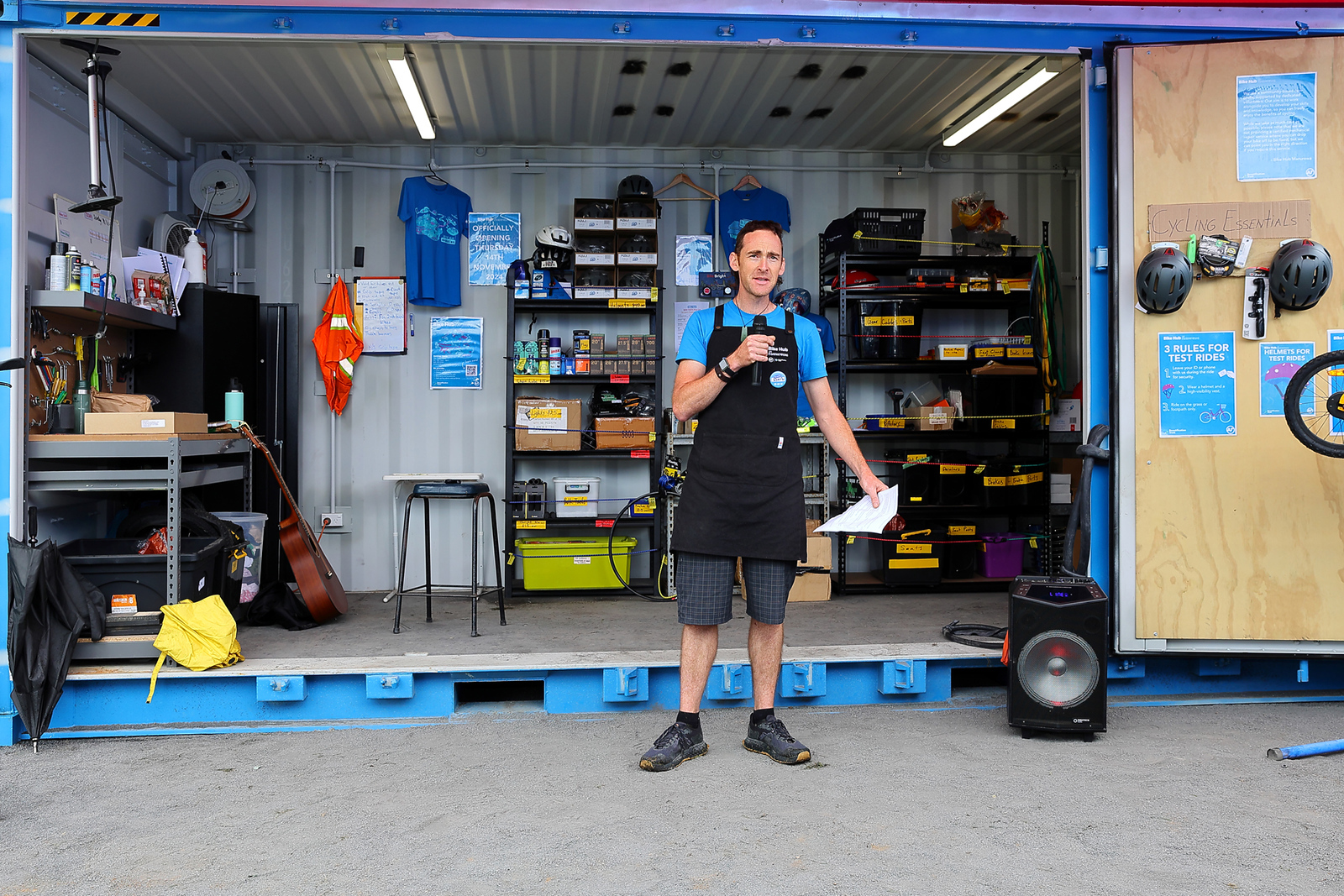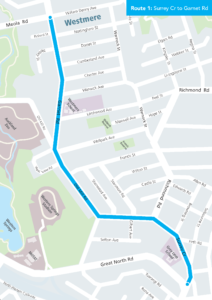
Of the four new routes currently being consulted on in Grey Lynn, the Surrey Cres-Old Mill Rd-Garnet Rd one is the longest and one of the most interesting. It runs directly past two primary schools, lots of houses, and small groups of corner shops – the latter often marking ‘ghost stops’ along the old tram line: friendly neighbourhood places to buy tobacco and a newspaper in the morning, or pick up your shopping on the way home from work.
It’s nice to think of those shops as pins on the map for the idea of a city organized around public transport and local community… biding time and holding space until it comes back into fashion.
At first glance, there’s a lot to like about this new bikeway route. It runs along a ridge, making it prime bike route material – we do love those gentler gradients. Plus, the road reserve + berms are extremely wide, so there’s quite a bit of space to play with.
That same generosity of space currently encourages motorists to drive fast and sometimes carelessly – so the traffic-calming effects of this project (e.g. the ‘floating’ bus stops, which will slightly narrow the carriageway) will be a bonus for everyone who lives or travels through here.
Another bonus is the improvements for pedestrians as well as people on bikes. A new zebra crossing at 120 Surrey Crescent for example will significantly improve safety for the families living in Fisherton, Stanmore, Francis, Castle and Sherwood whose children attend Grey Lynn School.
And (it’s to be hoped that) having visible bike lanes across all the side streets will encourage drivers to pause before turning, which makes life easier for pedestrians, too. NZTA is currently considering the matter of side-street priority for pedestrians and cyclists continuing in a straight direction, but that won’t be official for some time.
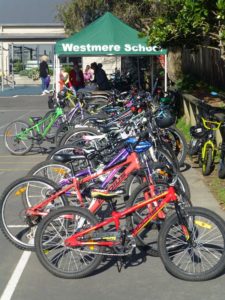
Above all, the bike lanes on this route are designed to protect riders from traffic – by separating them from moving cars. As we know, protected bike lanes make the biggest difference when it comes to encouraging the biggest ‘interested but concerned’ demographic – people who would bike if it was safer (which is 60% of Aucklanders, by one AT survey). So we see these cycleways as appealing hugely to families with school-aged kids, and people of all kinds who are keen to bike to town – or to those corner shops – if it’s made safer to do so.
Given that these lanes will also connect to Great North Road’s planned protected bike lanes and K Road’s planned protected bike lanes, and thus to Lightpath, Nelson St, and Quay St and eventually Skypath… the potential for rapid and wide uptake is really exciting. This route will be busy for the school run as much as for the milk run and the ‘work run’!
If you’re keen to support these lanes in principle, head straight on over to the quick-submit form. If you’re a detail-fiend, like us, and want a sense of the thinking behind our feedback before giving your own, read on…
Both Options A and B have aspects we support – and shortcomings we’d like to see improved. (NB we’ve already covered the flaws of the Richmond Rd intersection treatment at the end of this post). Both options involve some reallocation of street space from parking, which can be a hot button issue for residents and retailers.
We think the trade-off is well worth it, and that like cities all over the world, the benefits of neighbourhood bikeways as ‘pollinator paths’ for commerce and community will quickly become obvious – and indispensable.
NB A massive thanks to Bike Grey Lynn for nutting out the details below. We appreciate the on-the-ground expertise and time you’ve put in!
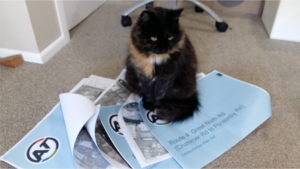
Option A: off-road path away from town, protected on-road towards town (see plans)
We don’t mind the off-road / on-berm bike paths, as they completely separate people on bikes from motor vehicles. And the on-road lanes will be protected by parked cars and/or physical separation.
However, we have reservations about how they work at minor and major intersections and would like AT to take another look at this.
- The Gilbert Ave intersection treatment on side roads is not satisfactory as it is potentially confusing. Cyclists are thrown onto the road for a short section in a potential conflict situation with motorists. Others may choose to stay on the path and wait until it is safe. And both might occur at once, making the situation harder for everyone to read: drivers, pedestrians, and people on bikes.
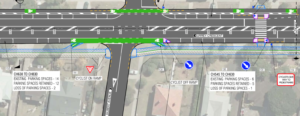
- Where the off road path intersects with all minor side roads, we prefer the Franklin Rd design style of raised tables. They cost more, of course, but can AT find some extra money to ‘be sweet’ to both pedestrians and bike people?
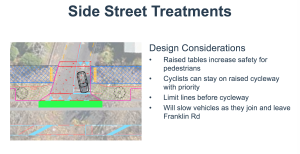
- The entrances to the side roads on the western and northern side of the route should be narrowed to tighten up the radii. (The roll call of streets that need this treatment reads like the supporting characters in a Shakespeare history! Stanmore, Sherwood, Francis, Warwick, Chester, Cumberland, Dorset, and Nottingham.)
- The Bullock Track side road remains very wide. We are unsure whether the treatment proposed is grunty enough for this currently very busy intersection. (It’s currently a major shortcut/ rat run, especially at rush hour – see here for what’s up at the bottom end of the Bullock Track.)
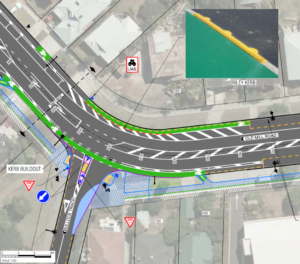
NB Option A would only reduce on-street parking by 10-15% (40 spaces over a 2km stretch), which we think is really minimal – and for that reason, residents may favour it over Option B, which reduces parking further.
Here’s the paradox, though: because the off-road cycleway would run along the berm, it would travel across the driveway aprons. Which means it would literally run into something that’s become habitual, even though it’s technically illegal… Yes, berm parking.
Increasingly, across the city, people are treating their driveway ‘aprons’ – and sometimes the adjacent grass too – as private parking spaces for parallel parking, or nose-in parking, or sometimes just long-term car storage. (NB Waitemata Local Board member Pippa Coom has written about this issue in the context of residents’ parking schemes). So if this option is chosen, we foresee a need for parking enforcement – at least until new habits are learned.
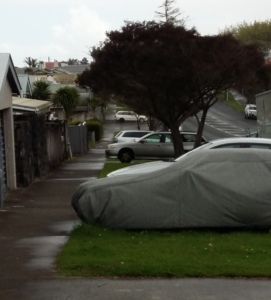
Option B: protected on-road lanes in both directions (see plans)
We support this option, as it eliminates the specific concerns of Option A. The on-road bike lanes run inside the parked cars. Our preference is for physical separation, like on Beach Rd, rather than painted buffers.
Given the greater reduction of on-street parking this option will involve (approximately 35-40%, or 120 spots over 2km), AT might as well do a proper job.
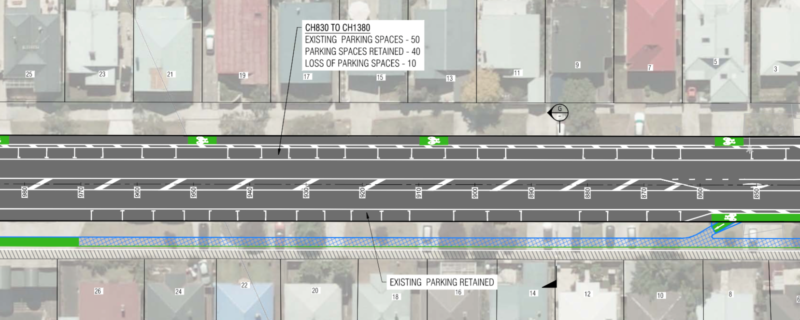
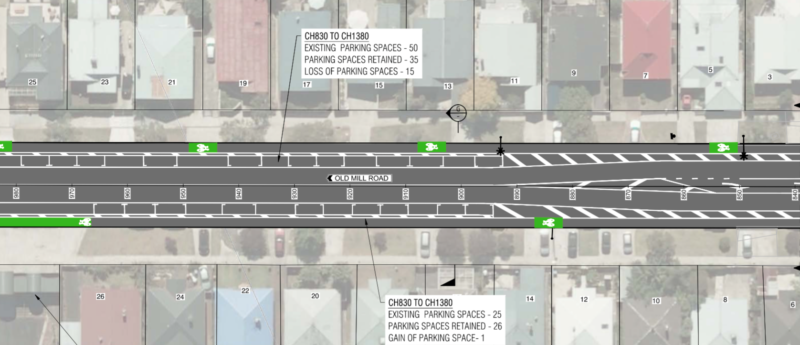
For both Option A & B
We believe that the proposed ‘Riley kerbs’ do not provide adequate protection and are unlikely to prevent motor vehicles straying into the cycle lanes at places where the road curves – like the intersections with Richmond Rd, Bullock Track, and where Old Mill Rd becomes Garnet Rd. We’d prefer intermittent Beach Rd style (slim) concrete buffers – maybe a short one every 10m or so? – as a backstop for the weaker Riley kerbs.
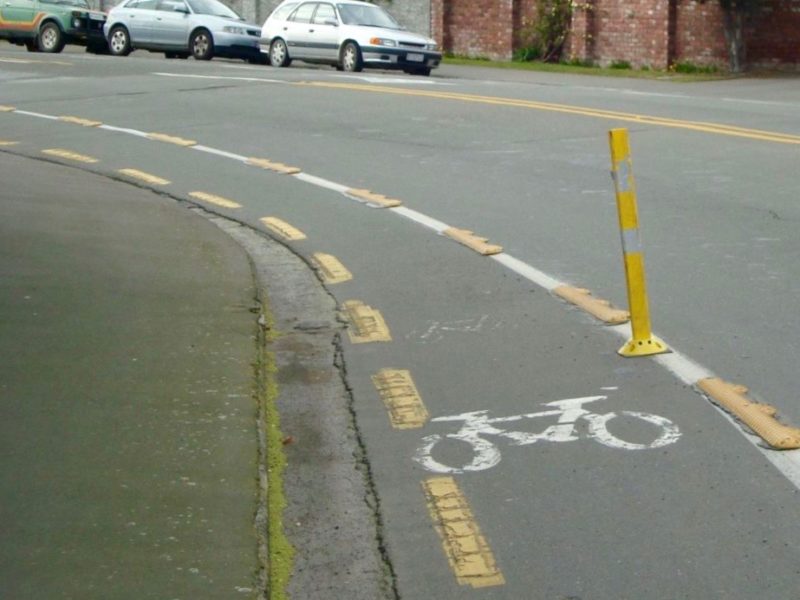
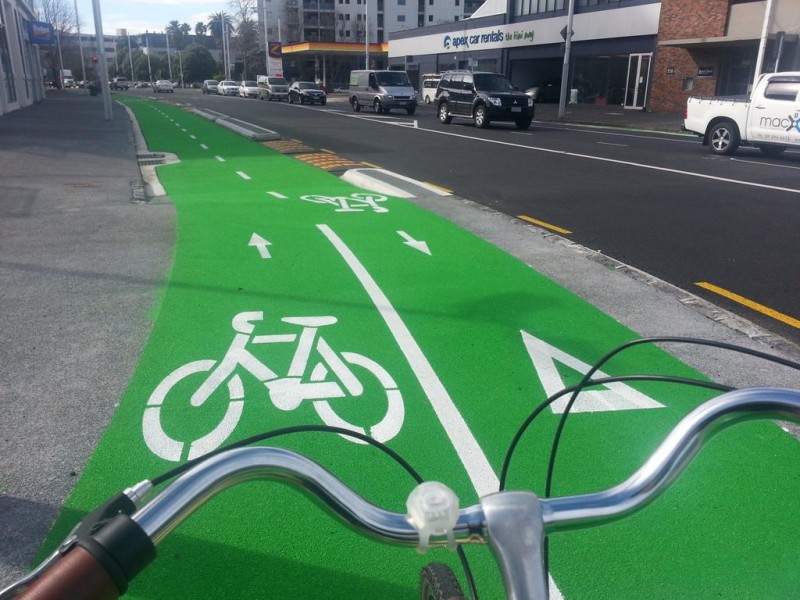
Righto, that’s our overview. With a few adjustments as noted above, both options for this route will:
- allow confident biking to school, shops, and work by more people of every age
- expand options for access to local destinations and the rest of the bike network
- make life safer and more pleasant for pedestrians
- and calm traffic speeds
- while keeping existing traffic lanes
- and preserving between 60-90% of current on-street car parking
We think that’s a pretty persuasive balance – what do you think? Have we missed any glaring opportunities to further encourage AT to improve these routes?
Here’s the project page again. Here’s the direct link for feedback on this section. And if you’re short on time, here’s the quick-submit page for support in principle of the whole Grey Lynn routes project. Off you go!

